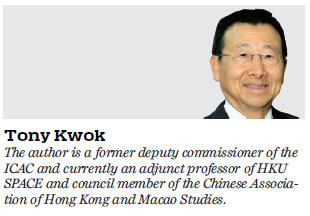Chris Patten risks undermining rule of law in Hong Kong
Updated: 2017-09-18 07:22
(HK Edition)
|
|||||||
Tony Kwok notes that the last governor's attack on the judiciary has drawn strong criticism from all sides
The jailing of Joshua Wong Chi-fung, Alex Chow Yong-kang and Nathan Law Kwun-chung by the Court of Appeal sent shock waves through certain foreign political circles, especially in the United States. Just recently Wong, Demosisto's secretary-general, was given red-carpet treatment in Washington and met with Democratic house leader Nancy Pelosi and Republican senators Tom Cotton and Marco Rubio. The latter two propose new legislation - "The Hong Kong Human Rights and Democracy Act" - which aims to "punish Hong Kong and mainland officials who suppress basic freedoms in the city". They even arranged for Wong to co-author a lengthy opinion piece in The Wall Street Journal in which he openly challenged the validity of the Basic Law and advocated independence for Hong Kong. All this suggests foreign politicians are spreading their political tentacles in Hong Kong beyond the old guard such as Martin Lee Chu-ming and Anson Chan Fang On-sang. Wong no doubt is flattered by the attention heaped on him by some US political heavyweights though we have to wonder if he can feel the strings attached to him and being pulled by his new friends.

The jailing of Wong and others clearly has upset the action plan of foreign political forces who were cultivating him and his collaborators to do their anti-China bidding from within the local political structure if they can be elected into the Legislative Council. As prison sentences would bar them from participating in the next LegCo election, these forces and certain foreign media promptly launched a ludicrous smear campaign against Hong Kong's judiciary, alleging their decisions are heavily influenced by Beijing. We have to ask why they failed to accuse Hong Kong judges of being biased when seven policemen were sentenced over their inappropriate handling of a protester during the "Occupy Central" unrest. But the absurdity of this blind onslaught against Hong Kong's judiciary reached new heights when foreign commentators claimed our court decisions were influenced by political considerations.
Former governor Chris Patten promptly jumped on the bandwagon and wrote to the Financial Times, suggesting the three were "persecuted" and the jailing was "a further example of Beijing tightening its grip on Hong Kong". He described the decision as "deplorable" and went on to say that "it will not of course curtail Hong Kong's ambitions for greater democracy. It will surely have the opposite effect".
Former public prosecutor of Hong Kong Grenville Cross expressed astonishment, saying Patten should know better, stressing that the judiciary is as independent now as it ever was during Patten's governorship. Cross reiterated that the initial punishment in the form of community service first meted out to the three student leaders was clearly inadequate and wrong considering the violence and injuries caused by the mob led by Wong and his cohorts in storming the locked forecourt of the east wing of the government headquarters in 2014. Needless to say, their foreign supporters' suggestion that the trio should be awarded the Nobel Peace Prize for their violent antics is laughable in the extreme.
Patten's letter was also disparaged by the former commissioner of the Independent Commission Against Corruption, Bertrand de Speville, who wrote: "Lord Patten describes as 'deplorable' the Hong Kong government's decision to appeal against the non-custodial sentences on the leaders of the pro-democracy 'umbrella movement'. By suggesting that Beijing directly influenced the decision of the secretary for justice, he undermines at a stroke of his pen the rule of law that is a pillar of the free and pluralist way of life the city continues to enjoy." De Speville, in his tenure as ICAC commissioner, used to work directly under Patten. Hence his moral courage and sense of righteousness should be applauded for standing up against his former boss' biased views.
Even in his own birthplace England, Patten was similarly rebuked by the former director of public prosecution Ken Macdonald, QC, who wrote in one newspaper commentary: "When disagreement (with the court's decision) strays into attacking a legitimate and universally recognised process of law, such as a prosecutor's right of appeal, or the personal integrity of the judges deciding the case, it is not really that legal process or those judges being attacked, it is the rule of law itself. People engaged in these rhetorical assaults risk undermining the very values they claim to defend."
As a former governor of Hong Kong, Patten should know better than anyone else the importance of the rule of law and judicial independence for Hong Kong. If he had read the open letter by Secretary for Justice Rimsky Yuen Kwok-keung, he would have to agree that the whole legal process was clearly in line with proper established judicial practice. He should also be embarrassed when he read the unprecedented joint statement of the Hong Kong Bar Association and the Law Society of Hong Kong, which expressed concern over the irresponsible comments in international media and stated, inter alia, "unfounded comments that judicial decisions were made or influenced by political consideration originating outside Hong Kong are unjustified and damaging to our legal system". Since departing as the last governor of Hong Kong 20 years ago, Patten has thrown far more brickbats than kudos in our direction, oftentimes seemingly trying to instil hatred in Hong Kong people against Beijing. No wonder he was labelled "a sinner of a thousand years" by Lu Ping, then head of the State Council's Hong Kong and Macao Affairs Office.
Patten is coming to Hong Kong to promote his new book. He would have a lot of explaining to do for his egregious attacks on Hong Kong's judicial system. Or was he just trying to drum up interest in his book at the expense of Hong Kong's rule of law?
(HK Edition 09/18/2017 page8)